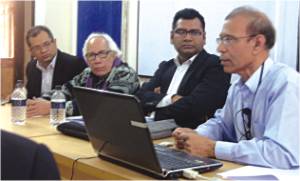Seminar
Lecture on the Roots of Islamism in Pakistan
H Ahmed
The Department of International Relations (IR) invited Dr Aminur Rahim, Associate Professor of Development Studies at the University of Fort Hare in South Africa to give a lecture to the students and faculty of the department on 18 January, 2012. The topic of Dr Rahim's lecture was 'Good Taliban, Bad Taliban: The Roots of Islamism in Pakistan; Lessons for Bangladesh.'
| |
 |
| |
Speaking to students. |
Saying that Pakistan ranked as the 12th most failed state according to The Failed States Index 2011 and that an average of more than one suicide bombing per week had killed 35,000 Pakistanis since 9/11, Dr. Rahim talked about the cause of the rise of religious violence in the country and attributed it to the rise of the Taliban in the 1980s, when an international coalition financed by the US was formed to raise Islamist jihadist groups to fight the invading Soviet troops in Afghanistan with direct help from Pakistan. He also pointed out that the mobilisation of the burgeoning lower classes on the right was set in motion by Prime Minister of Pakistan Zulfikar Ali Bhutto and concretised by General Muhammad Zia-ul-Haq, the fourth Chief Martial Law Administrator and the sixth President of Pakistan.
Dr. Rahim argues that conflict within Pakistan started with the inception of Pakistan in 1947. Islamisation in Pakistan had not occurred in one stroke, rather in stages, a well-known ideological underpinning of Pakistan's early years was its grounding in the religiously inspired state whether Pakistan would be a Deoband (a sect of Sunni Islam) state in which all other minority Muslims and non-Muslims would be treated as dhimmi (protected) or Islam was coterminous with republicanism.
Dr Rahim said that although Pakistan inherited strong democratic traditions, successive military coups have degraded its democratic institutions and undermined the credibility of its politicians. Instead of promoting an overlapping and consensus political model, the government controlled by the military establishment had promoted an uneven development and eschewed other backward areas of Pakistan. The visiting professor also said that the Taliban movement is the continuation of rationalisation of political Islam for the past 200 years.
Giving a historical perspective of political Islam to the students of the IR department, Dr Rahim talked about the trajectory of the religious and ethnic composition of Pakistan and how that moulded the politics practiced by those who were in power at various times. He discussed how Islamic Democracy was invented and a new Islamic Order was created. He also discussed the face of neo-Islamism and Deobandisation.
Dr Rahim said that unlike Pakistan, Bangladesh was sufficiently an imagined state. Muslim Bengal's ethno-nationalism had its roots in peasant nationalism which claimed the permanent tenure of land under the permanent settlement. Muslim identity had largely been shelved for the sake of achieving an equitable and democratic society. But after achieving independence, Bangladesh had plunged into a vortex of political and cultural struggle. The emergence of conflict is a manifestation of a culture war between liberals and religious and quasi-religious rights.This brand of Bangladeshi nationalism, said Dr Rahim, was deliberately politicised to counter India's political influence in Bangladesh. It has eventually opened the flood gates for using Islam for political purposes. This had a ripple effect on Bangladesh politics.By invoking the majority rule, the right wing establishment succeeded in transferring its communalism into Bangladeshi nationalism.
Assistant Professor Dr A.S.M. Ali Ashraf, Professor Dr RamjulHuq, and the Chairman of the IR Department Professor Dr DelwarHossain were also present during the lecture.
| 